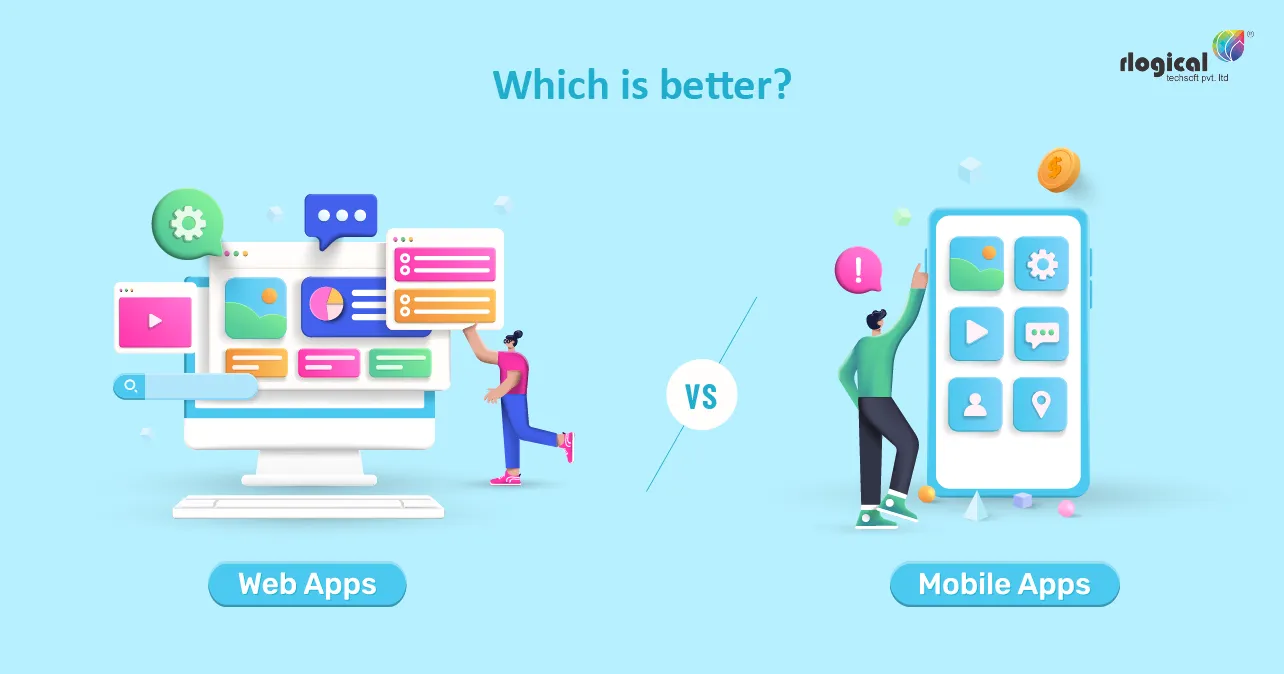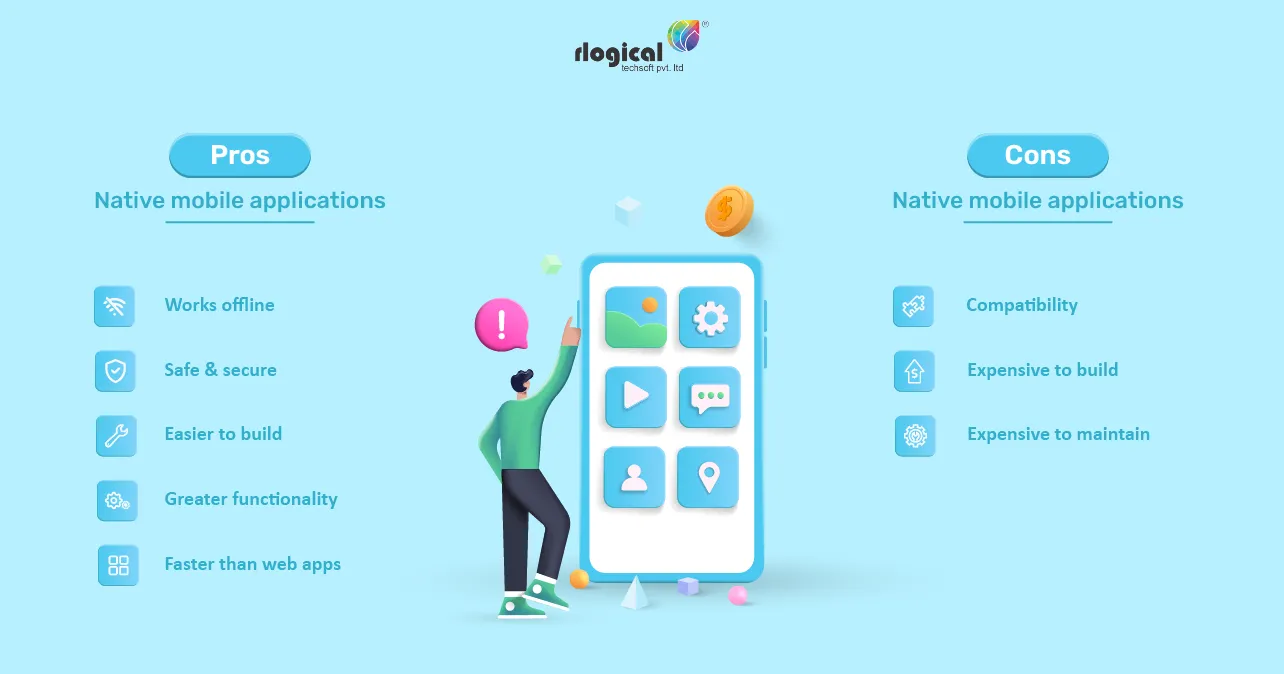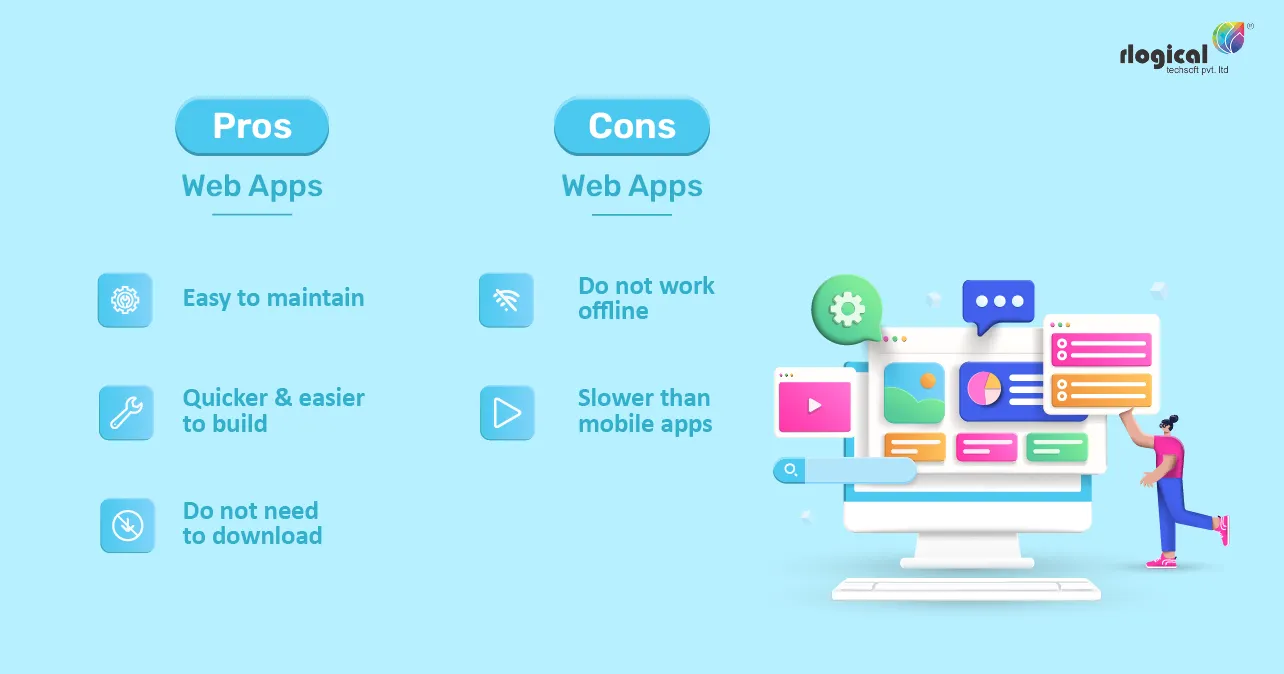
There are different types of apps today that we use. Among these apps, the most common are desktop, mobile, and web apps. People often think that web apps and mobile apps are the same. However, there is a slew of differences between the two types of apps. In today’s time, web apps and mobile apps are the most popular app options people use.
The ambiguity between the two comes from their utility. As long as both the apps are highly useful, people do not look at the finer points of differences. However, professionals in the app development field know the differences between web and mobile apps. This article focuses on comparing mobile apps and web apps in an attempt to know which is better.
The differences blur out as more people use mobile and web apps. How well the app performs depends on the features and functions of the app.
Mobile apps vs Web apps- an overview
A mobile app is one of the most common examples of application software. Mobile apps are in use in the mobile devices we use every day. Mobile apps are usually only designed for a certain purpose and are highly specific. Many mobile apps are lightweight and easy to load on mobile devices. Mobile apps have become very popular because of their utilities. From booking a hotel to finding a nearby restaurant, we have an app for every purpose today. A mobile app might come inbuilt into a phone’s memory, or you might download the apps into the phone from app stores.
On the other hand, a web app is completely different from a mobile app. A web application is software that runs on a browser platform with the help of a web server. The internet or the Intranet is used to access the app. The Web Application Development is used via the data connection and is not downloaded to the device. Web apps are more flexible in usage than mobile apps because they can run on any device and be accessed with the help of a network. There are many other differences between the two types of apps that you will find out in the next sections. The two types of apps have further diversified into different apps. For example, mobile apps have developed into hybrid and native mobile applications. On the other hand, web apps have evolved into progressive web apps.
How are mobile apps created?
To know the difference between the two types of apps, we have to go back to the roots of the same. The process that mobile apps development follow to develop differs from that of web apps. The resources used by the two types of app development frameworks are also different.
Mobile apps are more specific and require more money and resources to develop. Often mobile app developers have to start from scratch and create platform-specific app modules. Mobile apps’ design and development process are more advanced than web apps. The functionality and speed of mobile apps are also high. For native mobile applications, several specific languages are used to create the app code.
Web apps are developed using JavaScript, HTML and CSS. While mobile apps have specific development tools and platforms, web apps lack such platforms. There are also very less development kits for the same purpose. There are, however, several templates that web app developers use from time to time. Web apps are quicker and faster to build. Web apps also have lesser features as compared to mobile apps. When businesses wish to offer a lightweight and simplified version of the mobile app, they develop a web app. Since the investment in the web app is lesser, it has become very popular. People do not want heavy-weight apps that eat up the memory of mobile phones. People want to use apps that are lightweight and easy to access from anywhere.
Pros and cons of Native mobile apps

Pros of Native mobile apps
1. Faster than web apps
The performance and speed of native mobile apps are higher than that of web apps. Native web apps use the interface of the native mobile device and provide maximum speed and performance. On the other hand, the web app does not offer seamless performance and speed because it does not fit into the native mobile device.
2. Greater functionality
The native mobile apps have greater functionality than cross-platform and web apps because they have greater access to system resources and functionalities. The mobile app works like a part of the mobile phone and maximizes its performance with the help of system resources. It enhances the functions of the system and offers enhancements to system functionalities.
3. Works offline
One great advantage of native mobile applications is that the app can be run even without a substantial data connection. The mobile app runs in sync with the system interface, so it does not need an external data connection. Users can use native applications in offline mode too. They might not get all the app features in offline mode, but the basic features and information on the app will be accessible. The user will, therefore, be able to access and use the app under fluctuating connectivity conditions.
On the other hand, web apps need a connection with a web server to run. It means that when the app is in offline mode, it is inaccessible. When the web server is down, it is impossible to use the app on the device. Native mobile apps, therefore, win over web apps in terms of accessibility and usability.
4. Safe and secure
Compared with web apps, native mobile apps are highly secure for users. The native applications run with the native interface and use internal security features to protect customer data. On the other hand, the web apps are connected to web servers and are always vulnerable. Higher security provisions around the web app interface have helped resolve this issue. However, the security provisions are not as good as native mobile applications. Native mobile applications are not easy to breach.
5. Easier to build
When it comes to building a native mobile application, there might be a greater need for resources. However, the availability of resources and platforms for developing native applications is higher. You get many tools, platforms and resources to invest in the application. The availability of resources makes it easier for you to build the native application. Although the process may be longer than web apps, the availability of resources and ease of development provide you with better results in terms of app performance.
Cons of Native mobile applications
1. Expensive to build
The process of building new native mobile applications takes much investment in terms of money and resources. The process is more expensive as compared with the process of web app development.
2. Compatibility
Native apps are less compatible with other platforms. The native mobile applications are developed to run with a certain native system. Compatibility issues do arise with native applications when they are run on other systems.
3. Expensive to maintain
A native application for a mobile device is not just expensive to create but also to maintain and upgrade in further cycles of upgradation and maintenance.
Pros and cons of Web apps

Pros of Web apps
1. Do not need to download
You do not need to download the web app interface as it can be run directly on a web server. The web apps are browser functional and can be run without being downloaded. This helps keep the device memory free while using the best features of the web app. You can use the app with its most basic features and functions even without downloading.
2. Easy to maintain
It is not easy to maintain native mobile apps, but it is very easy to maintain web apps. Web apps have a single code base which helps in easy modification and maintenance. The code base does not change over multiple devices, so developers can change a single code element to bring about a change across multiple platforms.
3. Quicker and easier to build
Since web apps are lightweight and basic, they do not need much resources or time to be developed. The entire app is developed easily and at a shorter timeline. The web app is a good choice if resources and time are limited. Web apps do not need much investment and are easier to build than native mobile applications.
Cons of Web apps
1. Do not work offline
Web apps cannot work offline because the entire framework depends on the web servers. The web apps need a data connection and network connectivity for running. They do not work well when data connection and network strength fluctuate.
2. Slower than mobile apps
Web apps are slower than mobile apps because their framework is not as strong and secure as web apps. There are several reasons mobile apps are preferred over web apps, and lower speed and lack of security are some of the reasons.
Both web apps and mobile apps are good to use on mobile devices. However, from a functional point of view, native mobile apps are better than web apps. But from an economic point of view, web apps are better during development.
Rahul Panchal
Rahul Panchal is the Founder & Managing Director at Rlogical Techsoft Pvt. Ltd. He is a pioneer tech enthusiast who has assisted diverse enterprise solutions with a fresh perspective over the years. From integrating technologies like Full-Stack, .NET, Flutter & PHP, he has harnessed custom web or hybrid mobile app development projects. His creative outlook on the latest models of AI, ML, blockchain, and IoT, has made various businesses attain leading-edge success.
Related Blog
Categories
- All
- Amazon Web Services (AWS)
- ASP.Net Development
- Azure Web App
- Big Data Analytic
- Customize
- Digital Marketing
- Drupal Development
- E-commerce web development
- Education Mobile App Development
- Enterprise Application
- Event Management App Development
- Fintech
- Fitness App Development
- Food Delievery
- Front-End Development
- Healthcare App Development
- Hire Dedicated Developers
- Hotel Booking App
- IT Industry
- JavaScript Development
- Mobile App Development
- On Demand App Development
- On Demand Healthcare App Development
- PHP Development
- POS Software Development
- Real Estate Mobile App Development
- Retail Business App Development
- Salesforce
- Social Media Development
- Software Development
- Technology
- Transportation App Development
- UI/UX Design
- Web Design
- Web Development
- Web Services
- Web/Data Scraping Services
- WordPress



 Rahul Panchal in Mobile App Development
Rahul Panchal in Mobile App Development 





